高二英语M5U3导学案 (教师版 )
- 格式:doc
- 大小:139.50 KB
- 文档页数:6
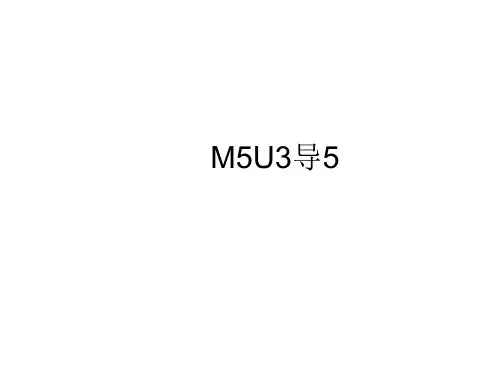
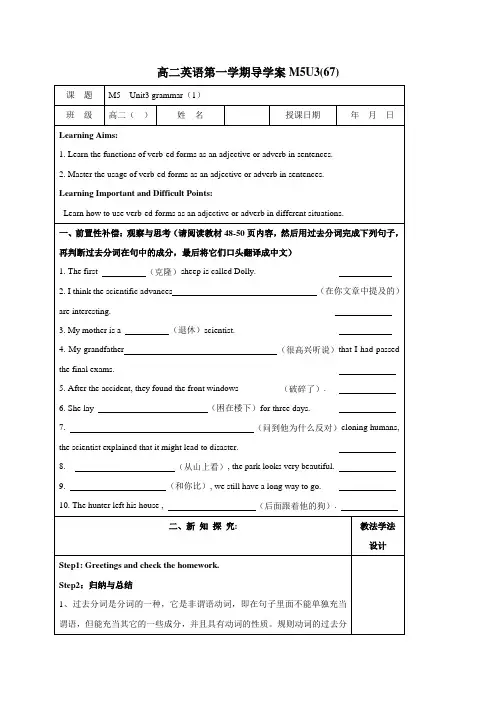
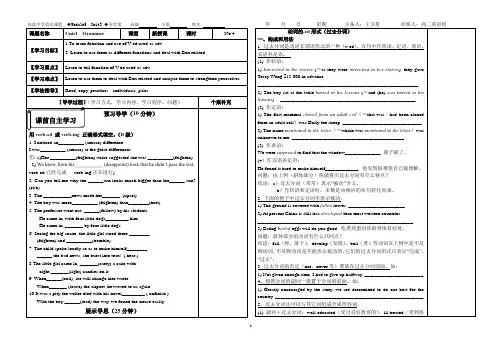
No.4因为对她的小说感兴趣,他们预付了Tracy Wong一万五千美元。
那位男孩坐在桌前,埋头做功课。
第一个用成年细胞克隆的哺乳动物是克隆羊多莉。
信里提到的名字我不熟。
was broken. understood地上铺满了落叶。
目前中国还没有多数西方国家发达。
由于没有给我足够的时间,我只得中途放弃。
在这个故事的鼓舞下,我们决心全心全意为祖国服务。
公众对他克隆人的意图感到震惊。
(感到)失望的父母苦笑了笑。
听众脸上挂着厌烦的表情。
结果令人失望。
(感到)失望的男孩令人失望的男孩1—5 BCADA 6—10 ABCBDNo.4因为对她的小说感兴趣,他们预付了Tracy Wong一万五千美元。
那位男孩坐在桌前,埋头做功课。
第一个用成年细胞克隆的哺乳动物是克隆羊多莉。
信里提到的名字我不熟。
was broken. understood地上铺满了落叶。
目前中国还没有多数西方国家发达。
由于没有给我足够的时间,我只得中途放弃。
在这个故事的鼓舞下,我们决心全心全意为祖国服务。
公众对他克隆人的意图感到震惊。
(感到)失望的父母苦笑了笑。
听众脸上挂着厌烦的表情。
结果令人失望。
(感到)失望的男孩令人失望的男孩1—5 BCADA 6—10 ABCBD No.4因为对她的小说感兴趣,他们预付了Tracy Wong一万五千美元。
那位男孩坐在桌前,埋头做功课。
第一个用成年细胞克隆的哺乳动物是克隆羊多莉。
信里提到的名字我不熟。
was broken. understood地上铺满了落叶。
目前中国还没有多数西方国家发达。
由于没有给我足够的时间,我只得中途放弃。
在这个故事的鼓舞下,我们决心全心全意为祖国服务。
公众对他克隆人的意图感到震惊。
(感到)失望的父母苦笑了笑。
听众脸上挂着厌烦的表情。
结果令人失望。
(感到)失望的男孩令人失望的男孩1—5 BCADA 6—10 ABCBDNo.4因为对她的小说感兴趣,他们预付了Tracy Wong一万五千美元。
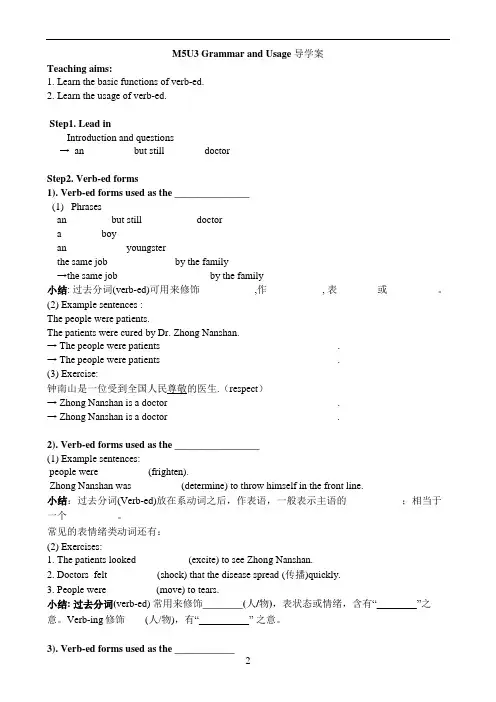
M5U3 Grammar and Usage 导学案Teaching aims:1. Learn the basic functions of verb-ed.2. Learn the usage of verb-ed.Step1. Lead inIntroduction and questions→ an _________ but still _______ doctorStep2. Verb-ed forms1). Verb-ed forms used as the _______________(1) Phrasesan ________ but still __________ doctora _______ boyan __________youngsterthe same job ____________ by the family→the same job _________________ by the family小结: 过去分词(verb-ed)可用来修饰___________,作___________, 表________或__________。
(2) Example sentences :The people were patients.The patients were cured by Dr. Zhong Nanshan.→ The people were patients ___________________________________.→ The people were patients ___________________________________.(3) Exercise:钟南山是一位受到全国人民尊敬的医生.(respect)→ Zhong Nanshan is a doctor__________________________________.→ Zhong Nanshan is a doctor__________________________________.2). Verb-ed forms used as the _________________(1) Example sentences:people were _________ (frighten).Zhong Nanshan was _________ (determine) to throw himself in the front line.小结:过去分词(Verb-ed)放在系动词之后,作表语,一般表示主语的___________;相当于一个__________。
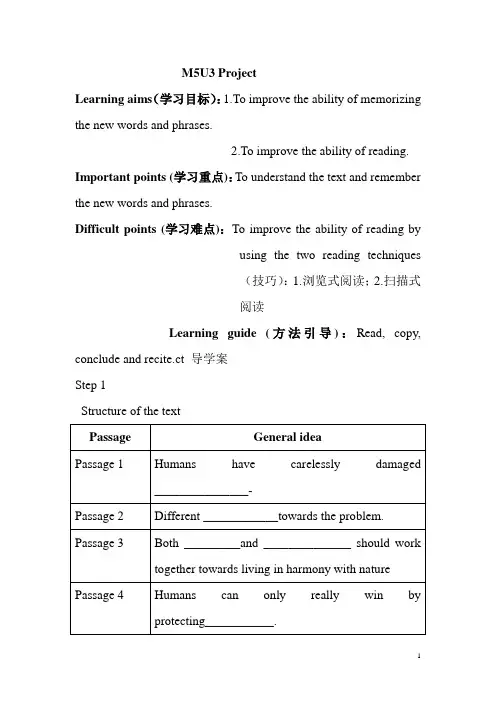
M5U3 ProjectLearning aims(学习目标):1.To improve the ability of memorizing the new words and phrases.2.To improve the ability of reading. Important points (学习重点):To understand the text and remember the new words and phrases.Difficult points (学习难点):To improve the ability of reading byusing the two reading techniques(技巧):1.浏览式阅读;2.扫描式阅读Learning guide (方法引导):Read, copy, conclude and recite.ct 导学案Step 1Structure of the textStep2: Scan the passage Science ands nature and answer these questions.(方法导引:采用扫描式阅读进行有选择有目的阅读,寻找某些资料或信息,对于无关部分可以忽略。
)1.What have people done to nature?_________________________2.If we continue in this way, what might happen?_______________________3.What did developing nations do decades ago? What are theyconcerned about now?______________________________________________4.It’s up to _______ to find the best way of benefiting both manand nature.A.developed nationsB. developing nationsC.mankind D. nature5.___________countries are using natural resources at a fast rate.A. RicherB. PoorerC.Developed D. All the aboveSkan the second passage and answer the following questions1.what tre people’s different attitudes towards the study ofgenetics?_______________________________________________________ _______________2.what are the two ways that an animal and a plant can begentically nodified?_______________________________________________________ _________________________________________________________________________ ____________________3.what is the one aim of GM reserch talked about in the article?4.what has GM technology been done to plants ?5.what are the problems about GM food and GM plants?_______________________________________________________ ______________Step3: Try to remember the new words and phrases as quickly as possible。
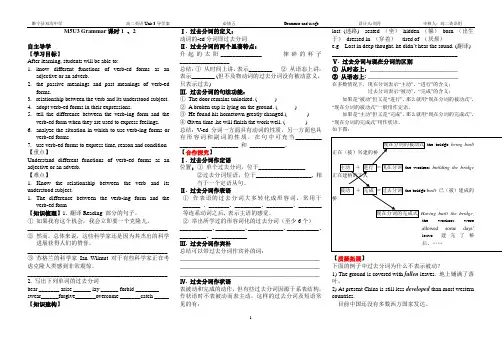
M5U3 Grammar课时1 、2自主导学【学习目标】After learning, students will be able to:1.know different functions of verb-ed forms as anadjective or an adverb.2.the passive meanings and past meanings of verb-edforms.3.relationship between the verb and its understood subject.4.adopt verb-ed forms in their expressions.5.tell the difference between the verb-ing form and theverb-ed form when they are used to express feelings. 6.analyze the situation in which to use verb-ing forms orverb-ed formse verb-ed forms to express time, reason and condition 【重点】Understand different functions of verb-ed forms as an adjective or an adverb.【难点】1. Know the relationship between the verb and its understood subject.1.The difference between the verb-ing form and theverb-ed form【知识梳理】1. 翻译Reading 部分的句子。
①如果我有这个机会,我会立即要一个克隆儿。
________________________________________________ ②然而,总体来说,这些科学家还是因为其杰出的科学进展获得人们的赞誉。
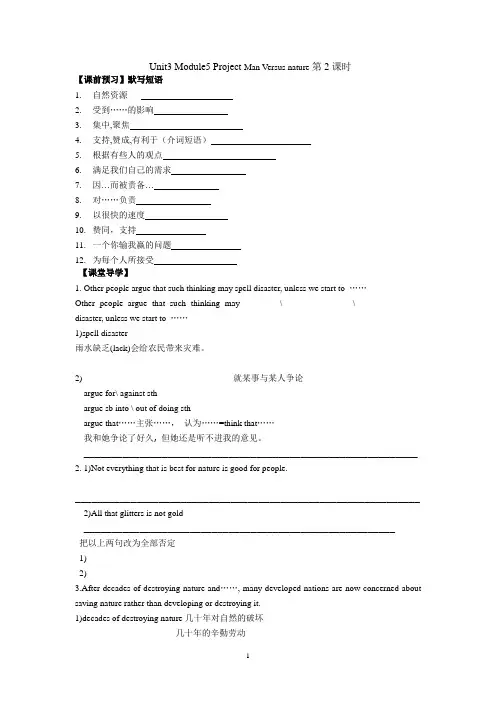
Unit3 Module5 Project Man Versus nature第2课时【课前预习】默写短语1.自然资源2.受到……的影响3.集中,聚焦4.支持,赞成,有利于(介词短语)5.根据有些人的观点6.满足我们自己的需求7.因…而被责备…8.对……负责9.以很快的速度10.赞同,支持11.一个你输我赢的问题12.为每个人所接受【课堂导学】1. Other people argue that such thinking may spell disaster, unless we start to ……Other people argue that such thinking may ________\________ _______\______ ________ disaster, unless we start to ……1)spell disaster__________________雨水缺乏(lack)会给农民带来灾难。
_______________________________________________________________________________ 2) __________________________________就某事与某人争论argue for\ against sth ___________________________________argue sb into \ out of doing sth_____________________________argue that……主张……,认为……=think that……我和她争论了好久, 但她还是听不进我的意见。
____________________________________________________________ 2. 1)Not everything that is best for nature is good for people.______________________________________________________________ 2)All that glitters is not gold________________________________________________________把以上两句改为全部否定1)_____________________________________________________________2)_______________________________________________________________3.After decades of destroying nature and……, many developed nations are now concerned about saving nature rather than developing or destroying it.1)decades of destroying nature几十年对自然的破坏_______________________几十年的辛勤劳动_____________________几个世纪对真理的追求(pursue)2)rather than _____________ other than ______________less than _______________ more than _______________Unfortunately, the research was limited ___ increasing economic profits, _____ protecting the environment.A. to; other thanB. by; rather thanC. to; rather thanD. by; more thanrather than用法归纳:rather than 与would 连用时,构成“would rather do….than do...”句式,意思是“宁愿……而不愿……”,表示主观愿望,即在两者之中选择其一。
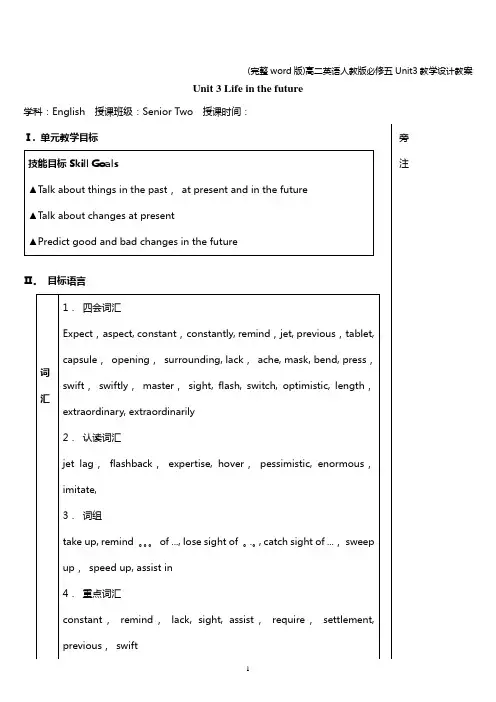
Unit 3 Life in the future 学科:English 授课班级:Senior Two 授课时间:Ⅰ. 单元教学目标Ⅱ。
目标语言旁注Ⅲ. 教材分析与教材重组1. 教材分析本单元以“Life in the future”为中心话题,旨在通过本单元的学习,让学生大胆发挥想象,对人类今后的生活环境,生活方式进行猜测,并在此基础上,对人类的种种活动进行反思,提倡环保生活意识.同时让学生学会过去分词作定语和作状语的不同用法。
最后让学生将本单元所讨论的话题和推测手法相结合,学习怎样写report。
1。
1 Warming Up 部分利用一个关于“住”和“行"的对比研究表格引导学生回顾过去,认识现在和展望未来。
通过这一活动,引发学生对过去,现在和未来的思考,使学生对将要阅读的文章有个知识准备。
1.2 Pre-reading 部分让学生充分运用发散思维,先列举当今世界人类面临的一些突出问题,然后要求学生思考为什么会产生这些问题,这些问题中哪些在未来社会仍然可能存在,哪些将会被克服,哪些将会恶化。
为下面的阅读做了铺垫。
1.3 Reading 部分通过一封发自未来的电子邮件,讲述了作者Li Qiang怎样安全到达“未来世界",他对“未来世界”的印象,以及“未来世界”的日常生活方式和交通工具情况.阅读时要把重点放在“未来世界”生活与当今生活的不同点上。
1。
4 Comprehending 部分设计了三个教学活动来加深学生对Reading部分的理解。
第一个活动要求学生通过阅读找出“未来世界"在以下几个方面的变化:跨时空旅行,交通,住房,城镇环境和空气质量.接着让学生在此基础上得出自己的结论,哪些变化好,哪些变化不好,并说明理由。
第二个活动要求学生通过阅读来判断Li Qiang对“未来世界”的态度是乐观的还是悲观的。
学生要在文中找出支持自己观点的论据,尽可能说服别人。
第三个活动让学生想象一下Li Qiang将会去参加哪些活动。
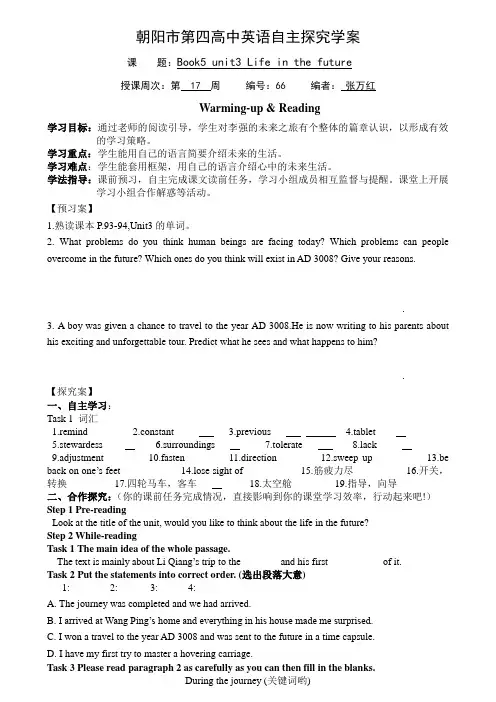
朝阳市第四高中英语自主探究学案课题:Book5 unit3 Life in the future授课周次:第 17 周编号:66 编者:张万红Warming-up & Reading学习目标:通过老师的阅读引导,学生对李强的未来之旅有个整体的篇章认识,以形成有效的学习策略。
学习重点:学生能用自己的语言简要介绍未来的生活。
学习难点:学生能套用框架,用自己的语言介绍心中的未来生活。
学法指导:课前预习,自主完成课文读前任务,学习小组成员相互监督与提醒。
课堂上开展学习小组合作解惑等活动。
【预习案】1.熟读课本P.93-94,Unit3的单词。
2. What problems do you think human beings are facing today? Which problems can people overcome in the future? Which ones do you think will exist in AD 3008? Give your reasons.______________________________________________________________________________________________________________________________________________________________________________________________________________________.3. A boy was given a chance to travel to the year AD 3008.He is now writing to his parents about his exciting and unforgettable tour. Predict what he sees and what happens to him?_______________________________________________________________________________________________________________________________________________.【探究案】一、自主学习:Task 1 词汇1.remind_________2.constant_____ ___3.previous___ _ __4.tablet____ ___5.stewardess ____ ____6.surroundings___ _____7.tolerate___ ____ck_____ __9.adjustment_________10.fasten________ 11.direction________ 12.sweep up__________ 13.be back on one’s feet ___________ 14.lose sight of___________ 15.筋疲力尽__________ 16.开关,转换_________ 17.四轮马车,客车___ _____ 18.太空舱________ 19.指导,向导__________二、合作探究:(你的课前任务完成情况,直接影响到你的课堂学习效率,行动起来吧!)Step 1 Pre-readingLook at the title of the unit, would you like to think about the life in the future?Step 2 While-readingTask 1 The main idea of the whole passage.The text is mainly about Li Qiang’s trip to the _______ and his first __________ of it.Task 2 Put the statements into correct order. (选出段落大意)1:______ 2:______ 3:______4:______A. The journey was completed and we had arrived.B. I arrived at Wang Ping’s home and everything in his house made me surprised.C. I won a travel to the year AD 3008 and was sent to the future in a time capsule.D. I have my first try to master a hovering carriage.Task 3 Please read paragraph 2 as carefully as you can then fill in the blanks.During the journey (关键词哟)Inside the capsule: ①through a ___________②_________________ seats③a ____________ drink ④ lay______________ ⑤completed the _________Task 4 Please read paragraph 4 as carefully as you can then fill in the blanks.Wang Ping ’s house (关键词哟)Step 3 Post--reading (课堂限时完成!小组PK )I have to remind myself constantly that I am taking up this prize and I am really in the year of AD3008. I suffered from “time lag ” that I kept getting flashbacks from previous time period. We climbed in the capsule through a small opening. It was comfortable. A few minutes later, the journey was completed and we had arrived. At first the surroundings were hard to tolerate. Because of the lack of fresh air, I’d got a headache. So I put on a mask. Then I followed Wang Ping to collect a hovering carriage driven by computer. These carriage float above the ground and by pressing down in the seat, we can move swiftly. Wang Ping showed me how to use it, but I lost sight of him soon. Later we arrived at a strange-looking house which had a green wall made of trees. Table and chairs could rise from the floor by flashing a switch on a computer screen. I was exhausted that night and fell asleep quickly.Frame(框架): How to introduce the life in the future--------Situation: _____________________________________________________________________________________________________________________________Aspects: ________________________________________________________________________________________________________________Change: ____________________________________________________________________________________________________________________________________________________________________Comments: _______________________________________________________________________________________________________________________朝阳市第四高中英语自主探究学案课 题:Book5 unit3 Life in the future授课周次:第 17 周 编号:67 编者: 张万红Reading学习目标:通过老师的阅读引导,学生对李强的未来之旅有个整体的篇章认识,以形成有效的学习策略。
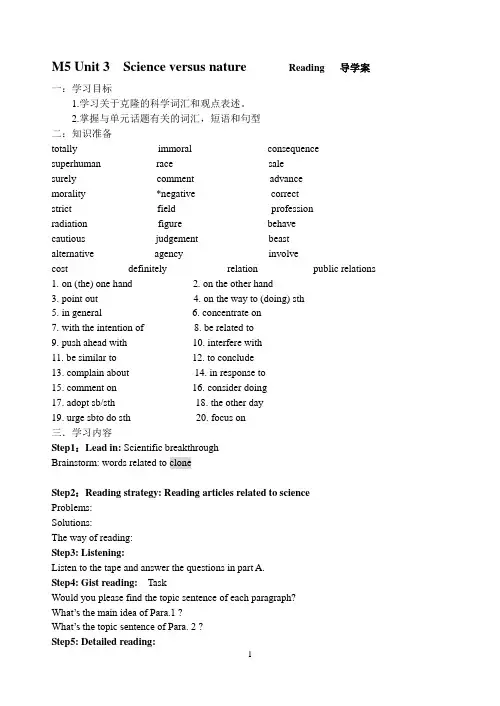
M5 Unit 3 Science versus nature Reading 导学案一:学习目标1.学习关于克隆的科学词汇和观点表述。
2.掌握与单元话题有关的词汇,短语和句型二:知识准备totally immoral consequence superhuman race salesurely comment advancemorality *negative correctstrict field professionradiation figure behavecautious judgement beastalternative agency involvecost definitely relation public relations 1. on (the) one hand 2. on the other hand3. point out4. on the way to (doing) sth5. in general6. concentrate on7. with the intention of 8. be related to9. push ahead with 10. interfere with11. be similar to 12. to conclude13. complain about 14. in response to15. comment on 16. consider doing17. adopt sb/sth 18. the other day19. urge sbto do sth 20. focus on三.学习内容Step1:Lead in: Scientific breakthroughBrainstorm: words related to clone_______________________________________________________________ Step2:Reading strategy: Reading articles related to scienceProblems:Solutions:The way of reading:Step3: Listening:Listen to the tape and answer the questions in part A.Step4: Gist reading:TaskWould you please find the topic sentence of each paragraph?What’s the main idea of Para.1 ?What’s the topic sentence of Para. 2 ?Step5: Detailed reading:1.Try to find out two different opinions in Para. 1 , Para. 2 & Para. 3 separately.2. Why does the writer write para.4 & para.5?3. What is the relationship between the last paragraph and the title?4. Find the reasons why people are pro- or anti-cloning to complete a table.(C2)5.Read the following two letters, and tell us what is mentioned in them.1.The passage is mainly about_______.2. We can learn from the two letters_______.Step6: DiscussionIf you are given a chance to clone, what would you like to do, and why?Step7: DebateIt is good to clone human embryos.For or against?Your reasons: __________________________________________________________ ______________________________________________________________________ ______________________________________________________________________ ______________________________________________________________________ ______________________________________________________________________ ______________________________________________________________________ ______________________________________________________________________ Useful words and phrases:1.I’m for/against human cloning because …2. I think/believe human cloning is…3. On a personal note, …4. I’m in complete agreement with…5. I can’t agree with what…said …6. I think what … stated is unreasonable…Language points:1. on (the) one hand…on the other hand…:有关hand的常用搭配:1.)(2003安徽)If you’re driving to the airport. Can you give me a ________?A. handB. seatC. driveD. lift2.) (2004福建) It is certain that he will ____ his business to his son when he gets old.A. take overB. think overC. hand overD.go over2. point常见搭配:相关高考试题:1.(2005广东)Many people who had seen the film were afraid to go to the forest when they remembered the scenes ___ people were eaten by the tiger.A. in whichB. by whichC. whichD. that2. (2003上海)I can think of many cases ___ students obviously knew a lot of English words and expressions but couldn,t write a good essay.A. whyB. whichC. asD. where3. (2001上海)He’s got himself into a dangerous situation ___ he is likely to lose control over the plane. A. where B. which C. while D. who3. on one’s / the way to (doing) sth.他离成为一个导演不远了。
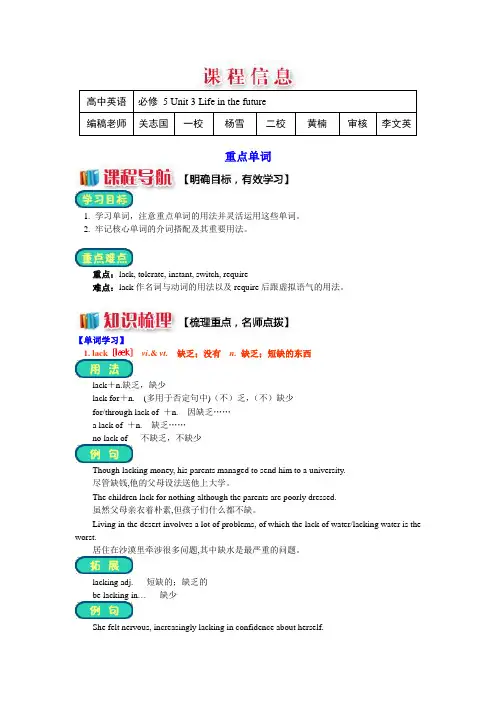
重点单词1. 学习单词,注意重点单词的用法并灵活运用这些单词。
2. 牢记核心单词的介词搭配及其重要用法。
重点:lack, tolerate, instant, switch, require难点:lack作名词与动词的用法以及require后跟虚拟语气的用法。
【单词学习】1. lack vi.& vt.缺乏;没有n. 缺乏;短缺的东西lack+n.缺乏,缺少lack for+n.(多用于否定句中)(不)乏,(不)缺少for/through lack of +n. 因缺乏……a lack of +n. 缺乏……no lack of 不缺乏,不缺少Though lacking money, his parents managed to send him to a university.尽管缺钱,他的父母设法送他上大学。
The children lack for nothing although the parents are poorly dressed.虽然父母亲衣着朴素,但孩子们什么都不缺。
Living in the desert involves a lot of problems, of which the lack of water/lacking water is the worst.居住在沙漠里牵涉很多问题,其中缺水是最严重的问题。
lacking adj. 短缺的;缺乏的be lacking in…缺少She felt nervous, increasingly lacking in confidence about herself.她感到紧张,对自己越来越没有信心。
She’s not usually lacking in confidence.她平时并不缺乏自信心。
Health problems are closely connected with bad eating habits and a ________ of exercise.A. limitB. lackC. needD. demand答案:B思路分析:句意:健康问题与不良的饮食习惯和缺少锻炼密切相关。
Unit 3 Life in the futurePeriod 2I 词形变化1. ______________ n. 印象, 感想_____________v. 印, 留下印象 adj.令人印象深刻的2. ____________ adj时常发生的,连续不断的______ ___ adv不断地3. _______________ n. 定居;解决________________ v. 安放, 使定居, 安排; 安家, 定居定居者,殖民者4. ______ _______ v. 按;压;逼迫______________ n. 压, 压力5. ________________ n.移居者;殖民者______________ vt. 调停;安排;支付vi.定居;飞落n.解决,协议;居留地6. ________________ adj乐观的_____________ n 乐观主义→______________ n.乐观主义者adj(反义词)悲观的7. ____________ n. 缺乏,短缺的东_____________ v 缺乏,没有adj缺乏的,短缺的8. ________________ adj筋疲力尽的,疲惫的______________adj 令人疲惫的vt使……筋疲力尽n 筋疲力尽9. n&adj瞬间;片刻;立即的;立刻的adv 立刻地,10. n. 周围的事物;环境adj周围的v包围11. adj不确切的,无把握的adj确切的,把握的12. n调整,调节vt.调整,调节13. vt回收利用,再利用adj可回收的14 n泥adj.泥泞的,多泥的15 n&adj.代表;典型人物;典型的,有代表性的v代表,象征16 v 忍受,宽容adj宽容的,忍受的n宽容,忍受,有忍耐力II. 单词拼写1. The strikers and the employers have reached a (解决协议)over new working conditions.2. Your performance gave me a strong i3 P to the conference we had discussed the matter.4. Though _________(缺乏)money,his parents managed to send him to university.5.This entrance is in (经常的,持续不断的)use; do not block it.6.she is not o about the future.7.I know the place well, so let me be your g .8 I recognized her the i I saw her.III重点词组1. ____________________ 拿起,接受,开始,继续2. __________________ 看不见……3. ____________________打扫,横扫4. _________________移动,溜进5. ____________________ 加速6. _________________一千年以后7. ____________________ 因此8. __________________穿上,上演9. __________________ 作出调整10. __________________ 缺乏11. _________________ 恢复,完全复原12. ________________ 安全带13. _________________ 四面八方14. ________________ 看到15 熟睡16 飞行时差反应IV. 结合同步,完成下列语言点归纳1 tale up佳句默写1)我还是无法相信我是在接受去年获得的这个奖励2)这张旧桌子占据的空间太大。
Unit3 Using Language Reading公开课导学案Book 5 Unit 3 Life in the futureUsing language导学案彩虹中学南校区杨璐【Learning aims (学习目标)】1.Understand the text and know about the life in the future.2.Develop reading ability and learn different reading skills.【Learning tips (学法指导) 】1. Try to grasp the structure of the text by reading the first sentence of each paragraph.2.Underline the key words and sentences in the passage.课前预习Read the passage and answer the following questions.1 Where did the author visit?___________________2 How many modern inventions of the 31st century did the author see? Choose from the following pictures.thoughtpad robot waste machine flying car 预习课文主旨(注意文章中G 指代导游)课堂探究【合作探究】Task I Fast readingRead the text quickly and answer the following questions.1What is the space station like? _________________2 Which of the following shows the right order to use a “thought pad”?1.把握文章主旨大意方法导引(注意关。
Unit3 Module5 Project Man Versus nature第1课时【课前预习】重点短语(Word power—Project)1.in favour of 赞同,支持2.be worthy of being done值得做某事3.be worthy to be done 值得做某事4.be similar to 与…..相似5.lie trapped 被困在6.in the field of science 在科学领域7.the other day 某一天(过去)8.on your part 对你而言9.dare (to) do sth. 敢做某事10.be tired out 筋疲力尽的11.be burnt out筋疲力尽的12.do research on 研究某事13.mind doing sth.介意做某事14.side effects 副作用pare with 把…和…..做比较pare to 把…..比作…..17.with reference to 关于18.in reply to回应,回复19.in response to 回应,回复plain about 抱怨某事21.follow in their footsteps追寻他们的足迹22.conduct a survey 进行一项调查23.the majority of people 大部分人24.urge sb. to do sth. 催促某人做某事25.be resistant to sb./sth. 对抗某人26.so far 到目前为止27.rather than 而不是28.over the past few years 在过去的几年里29.natural resources 自然资源30.focus on environmental conservation 关注环境保护31.from the point of view of sb.就某人而言32.meet our own needs满足我们自己的需要33.spell disaster 招致灾难34.at a fast rate 快速35.be blamed for 因为…被责备36.turn out 结果是,证明是37.after all 毕竟38. a question of humans winning and naturelosing 一个你赢我输的问题翻译并背诵重点句子1.Wound anyone say that economic development should be stopped in favour of nature? (line9-10)2.From the point of view of some people, we are only doing what humans have always done,using nature to meet our own needs. (line 10-12)3.Other people argue that such thinking may spell disaster, unless we start to look around andunderstand how a clean environment benefits us all. (line 12-14)4.After decades of destroying nature and using up earth’s natural resources, manydeveloped nations are now concerned about saving nature rather than developing or destroying it.(line16-18)5.Most of time it turns out that humans are not really profiting when they damage theenvironment. (line 28-30)【课堂导学】Step1 Reading comprehension1. Reading the passage and find out the main idea of each paragraph.Para1 ______________ __ have been seriously affected by carelessness.Para2 ____________________towards the problem.Para3 Humans are moving towards_________________________________.Para4 Humans can only really win by_________________.2. Task-based readingNatural resources have been seriously affected by our__________. _________ and mankind are believed to be __________ nature. Earth’s resources are endlessly _________ through agriculture, fishing, hunting and tourism. People _________ new water channels for shipping, building new factories and creating pollution with industrial waste to __________ damage Earth.Should we _________ economic development in _________ of nature? On the one hand, some people think we are doing what humans have always done, using nature to meet our own_________. On the other hand, others __________ that such things may _________ disaster. Humans can only really _________ by protecting nature. Most of the time it turns out tha humans are not really _________ when they damage the environment. Food has to be produced in a healthy, natural __________. It’s mankind’s responsibility to find _________ that are acceptable for everything and everyone.【课后练习】选词填空1.The meetings made him tired.2. China is a country while the USA is a one.3. Are you the plan.4. The quarrel was settled in a way that was to both sides.5. That pretty lady we met to be a thief.6. He is always doing his homework and making so many mistakes.7. Demand for like coal and steel is increasing.8. A new library building is under in our school.9. Is she ill?10. They were having an about the children.同义句转换1) 1)Many developed nations destroyed nature and used all of Earth’s natural resources.Many developed nations destroyed nature and __________ _________Earth’s natural resources.2)The developing and developed countries of the world need to worked together to ensure thatpeople enjoy healthy and productive lives.The developing and developed countries of the world need to worked together to ____________that people enjoy healthy and productive lives.3)A clean environment benefits us all.All of us ________ ________ A clean environment.4)The bridge is under repair.The bridge _________ ________ __________.5)Some of the students like the lecture about American culture, while others don’t. _____ ________ the students ______ _______in the lecture about American culture.。
高中英语真题:M5U3Reading导学案Learning aims(学习目标):To improve the ability of reading Important points(学习重点):To analyze the whole text and know about the structure and the main idea of the textDifficult points(学习难点): How to improve the skills of understanding scientific terms .Learning guides(方法导引): Read, copy and reciteLearning procedures(学习过程):Step1: Try to remember the new words as quickly as possible (温馨提示:说一千,道一万,记住单词是关键!)Read and recite new words and phrases from versus to moralit y three times.(方法导引:按音标正确读,背单词和短语)(A 级)Copy the new words and phrases from versus to morality three times.(方法导引:汉语只需抄一遍,抄写后应会默写这些单词)(1)__________ n.细胞(2)_________ n.胚胎(3)__________ n.宣告,通告,通知(4)_________ prep.与。
相对(5)__________vi.干涉,干预,干扰(6)_________ adj.苏格兰的(7)__________ n.女售货员(8)_________ vt.收养,领养(9)__________ n.人类(10)__________vt.& n.表扬,赞扬(11)__________vt.生产(婴儿);接生(12)___________n.道德(13)__________ n.种族(14)___________adv.当然,肯定(15)__________adj.不道德的(16)___________n.山羊(17)__________ n.突破(18)___________ adj.超人的(19)__________adv.从基因上来说地(20)____________adj.医学的,医疗的(21)__________ n. 进步,前进(22)____________n.出售,销售(23)__________ n.意图,目的;企图(24)____________vi.评论,点评(25)__________ n.忧虑,焦虑,不安(26)____________vt.有利于,使。
江苏省响水中学高二英语导学案主备人:潘恩玉审稿:陈新来2013-8 M5 U3 Science and nature(for teachers only ) Language points:【重点突破】1. Scientists have announced that they have cloned the first human embryo.(P42L1)announce vt. 宣布,宣告,名词为announcement【译译看】学生们正在等待要被学校宣布的结果。
The students are waiting for the results announced by the school.【辨析】announce ,declareannounce 侧重宣告人们所关心或感兴趣的事,尤指新闻之类的消息。
declare 侧重正式明确向公众“宣布,宣告,声明,”常用于宣战。
Eg.Though they’ve announced that they can clone humans,they are always declaring seriously that they won’t do that . 【选一选】Please remain seated . The winner of the prize will be _________ soon .A.saidB.announcedC. spokenD. voiced2.On the one hand,some scientists point out that if you clone an embryo ,you can produce valuable humantissues---such as ...(P42L2,L5)on (the) one hand …on the other hand 一方面,另一方面Eg .He is fit for the job . 一方面他英语好,另一方面他会用电脑。
One the one hand he is good at English; on the other hand he can operate a computer .【短语拓展】for one thing … for another 首先,其次。
point out 是固定短语,意为“指出,指给某人看”后可接名词或从句,point at 指着,对准Eg. I will point him out to you next time he comes .【短语拓展】1) point to 指向2)point at 指着3)There’s no point (in) doing sth.做某事无意义4)make a point 提出观点5)come to the point 说到点子上,直接说6)to the point 切题,切中要害7)off the point 离题8)on the point of doing sth 正要做某事3. She was born in 1996 and died in early 2003, at a much younger age than normal (P42L11)normal作名词,意为“正常”;还可用作形容词,意为“正常的,常规的,标准的”【译译看】1)花了几个星期才使一切恢复正常。
It took several weeks for everything to return to normal .2)这样长途旅行之后感到疲劳是正常的。
It is normal to feel tired after such a long journey.【辨析】1)normal temperature 常温2) ordinary people 普通人3) at the usual time 在往常时间4)a man of average abilities 一个能力一般的人5) a regular flight 固定航班6)common sense常识4.When she was born,many people were worried that cloning would lead to more diseases in the animal world .(P42L12) lead to 意为“导致,通向”to 为介词lead … to…带领。
到。
【译一译】他的愚蠢行为导致了他的失败。
His foolish behaviour led to his failure .All roads lead to Rome . 条条大路通罗马/殊途同归.【选一选】The news shocked the public , ________ to great concern about students’ safety at school.A.having ledB. ledC. leadingD. to lead 5. However, in general the scientists were praised for their wonderful scientific advance .(P42L12,L13)in general 一般说来,大体上,通常,相当于generally (speaking)【短语拓展】in 构成的短语:1)in all 总共,总计2)in reality 事实上,实际上3) in fact 事实上4)in need 需要,缺乏,处于困境5)in public 当众,在公开场合6)in secret 秘密地,暗中7)in danger 处于危险中8)in ruins 成为废墟9)in a word 总之10) in use 在使用中praise vt. & n. 表扬,赞扬,表彰1) in praise of 赞美2)sing the praise of 赞扬3)praise sb. for sth 因某事赞扬某人6. Although he researches cloning ,his intention has never been to create copies of humans .(P42L16)intention n. 意图,目的,其动词形式为intend,想要,打算intend to do sth / intend sb to do sth /intend … for …【译译看】1)好的行动胜与好的意图。
Good action is better than good intention .2)他打算让儿子经营那家公司。
He intended his son to manage the company .3)那栋房子是为他女儿准备的。
The house is intended for his daughter .【短语拓展】1)with the intention of 带着。
的意图2) by intention 故意地3)without intention 不是故意地,无意中7.Instead , he thinks research efforts should concentrate on creating new tissues and organs that can be used to cure diseases like cancer .(P42L17)concentrate … on sth/doing sth 全神贯注于某事、做某事Eg. I decided to concentrate all my efforts on finding somewhere to live .【短语拓展】“专心于”同义词组:put one’s heart into ; fix one’s mind on ; be occupied in ; be buried in ; be absorbed in ; devote oneself to ;【译一译】1)Nothing is difficult ,if you put your heart into it .世上无难事,只怕有心人。
2)He is buried in his books . 他在埋头看书。
8. However, some people believe that cloning human embryos with the intention of destroying them shows no respect for human life .(P42L20)respect 在此句中作名词,意为“尊重,尊敬”。
也可用作动词,意为“尊重,尊敬”。
其形容词为respectful 恭敬的,尊敬的;而respectable 则为“可敬的,体面的”意思。
Eg. We should show respect for our parents and teachers.【短语拓展】1)show/have respect for 对。
表示敬意2) out of respect for 出于对。
的敬意3)respect sb/sth for sth 因。
尊敬某人4) respect oneself 自尊【译译看】如果你不尊重自己怎么能指望别人尊重你呢If you don’t respect yourself , how can you expect others to respect you另外respect还有“点,方面”之意1)in some respects 在某些方面2)with respect to关于9. ‘I’m anxious to have a child of my own ,’she says . (P42L22)anxious adj 焦急的,焦虑的,渴望。
的,其名词为“anxiety”【短语拓展】1)be anxious about sb/sth 对。
焦虑2)be anxious for sth 渴望,非常希望得到3)be anxious to do sth 渴望,非常希望做某事【译一译】她担心即将到来的考试。
She is anxious about the coming exam .10. While cloning human embryos is not legal in many countries ,some scientists are already pushing ahead withreasearch in order to produce a cloned human baby.(P42L25)while 表示对比,意为“而,然而”;表示让步,意为“虽然,尽管;还可引导时间状语从句,意为“当。